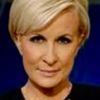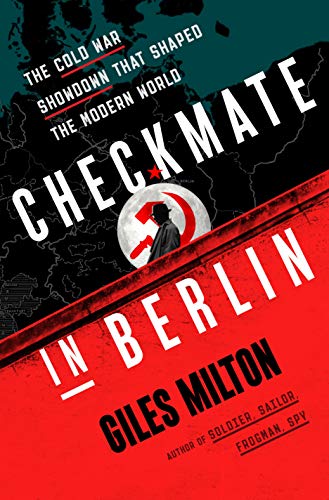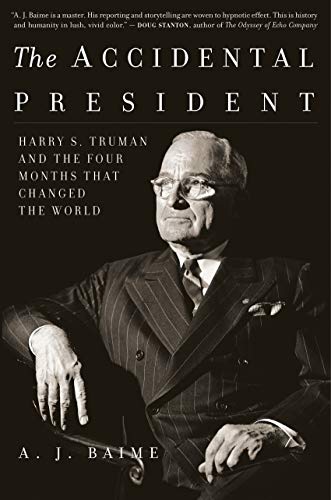20 US Cold War History Books That Reveal America's Global Strategy
Recommended by John Lewis Gaddis, Mika Brzezinski, and Asha Rangappa, these US Cold War History books offer expert insights and strategic perspectives.


What if you could trace the Cold War's complex history through the eyes of those who shaped it? This era, marked by tension and near catastrophe, still shapes global politics today. Understanding it matters more than ever as new geopolitical challenges emerge.
John Lewis Gaddis, the Pulitzer Prize-winning historian, has praised The Peacemaker for redefining our grasp of Reagan’s role, while Mika Brzezinski highlights Saving Freedom for capturing Truman's pivotal leadership. Meanwhile, former FBI agent Asha Rangappa underscores The Folly and the Glory as essential for grasping the shadow battles behind the scenes.
These expert-curated books offer proven frameworks to navigate Cold War history, yet if you seek content tailored to your unique interests—be it espionage tradecraft, diplomacy, or military strategy—you might consider creating a personalized US Cold War History book that builds on these insights.
Recommended by John Lewis Gaddis
Pulitzer Prize-winning author and strategist
“William Inboden’s The Peacemaker makes the strongest case yet for Reagan as a successful grand strategist. Clearly written, thoroughly researched, full of fresh information, this comprehensive account will shape all future studies of the role the United States played in ending the Cold War.”
by William Inboden··You?
by William Inboden··You?
Drawing from his extensive experience as a policymaker and academic, William Inboden crafts a detailed narrative of Ronald Reagan's Cold War strategy that is both richly informed and deeply analytical. You gain insight into Reagan's complex approach, balancing aggressive arms competition with cautious diplomacy, while managing global crises from terrorism to proxy wars. The book reveals how Reagan's team, despite internal rivalries, shaped a new path toward ending Soviet dominance through multifaceted policies. For those intrigued by presidential decision-making and Cold War diplomacy, this work offers a nuanced understanding of the era's geopolitical chess game.
Recommended by Mika Brzezinski
Co-host of Morning Joe, political commentator
“So proud of Joe — His great book is now out in paperback!!!!” (from X)
by Joe Scarborough··You?
by Joe Scarborough··You?
Joe Scarborough, a former congressman and seasoned political commentator, explores the critical pivot in U.S. foreign policy under Harry Truman, revealing how an unprepared president orchestrated a bipartisan coalition to confront Soviet expansionism. You’ll gain insight into the domestic political battles and global stakes behind the Truman Doctrine, with detailed accounts of key moments like the 1947 address to Congress and the strategic defense of Greece and Turkey. The book suits anyone interested in Cold War dynamics, presidential leadership, and the origins of America’s postwar international role, providing a clear view of how Truman’s decisions shaped decades of Western freedom and global order.
This tailored exploration of US Cold War history offers a meticulous journey through the era's pivotal events, figures, and global dynamics. The book is crafted to match your background and specific interests, whether they lie in diplomacy, espionage, military conflicts, or political leadership. It delves into the complexities of US-Soviet relations, revealing the nuanced interactions that shaped decades of tension and cooperation. By focusing on your unique goals, this personalized guide facilitates a deeper understanding of Cold War strategies and outcomes. It weaves together expert knowledge with your particular areas of curiosity, ensuring a compelling and focused learning experience that illuminates the intricate fabric of this defining period in modern history.
Recommended by Patrick Radden Keefe
New York Times bestselling author
“In this sweeping, vivid, beautifully observed book, Scott Anderson unearths the devastating secret history of how the United States lost the plot during the Cold War. By focusing on the twisty, colorful lives of four legendary spies, Anderson distills the larger geopolitical saga into an intimate story of flawed but talented men, of the 'disease of empires,' and of the inescapable moral hazard of American idealism and power. It's a hell of a book, with themes about the unintended consequences of espionage and interventionism that still resonate, powerfully, today.”
by Scott Anderson··You?
by Scott Anderson··You?
Scott Anderson, a seasoned war correspondent and bestselling author known for Lawrence in Arabia, delves into the covert world of early Cold War espionage with sharp narrative skill. You gain an intimate look at four CIA agents—each navigating complex geopolitical landscapes and internal agency struggles—that reveals how American intelligence efforts were often undermined by political missteps and rigid ideology. The book offers detailed portraits of figures like Frank Wisner and Edward Lansdale, illustrating how their missions shaped, and sometimes fractured, U.S. foreign policy. This is a revealing read if you want to understand the human and strategic dimensions behind Cold War intelligence operations and their lasting impact on America’s global standing.
Recommended by Asha Rangappa
Former FBI agent and Yale faculty
“This is a great book -- I will be discussing it with Tim Weiner on October 5! Register here” (from X)
The breakthrough moment came when Pulitzer Prize winner Tim Weiner drew from decades of national security reporting to unravel the complex dance of political warfare between the US and Russia from 1945 through 2020. You’ll gain sharp insights into espionage tactics, covert operations, and the evolving strategies behind election interference, with vivid chapters detailing CIA and KGB maneuvers and Putin’s modern influence campaigns. This isn’t just history; it’s a cautionary tale about the vulnerabilities of American democracy that invites you to understand the stakes and the shadow conflicts shaping today’s world. If you seek an unflinching look at power struggles that transcend traditional warfare, this book will engage you thoroughly.
Recommended by Dame Stella Rimington
Former Director of MI5
“Intriguing true stories of the techniques of CIA spying on the dangerous front line of the Cold War.”
by Antonio J. Mendez, Jonna Mendez··You?
by Antonio J. Mendez, Jonna Mendez··You?
Antonio and Jonna Mendez bring firsthand CIA experience to illuminate the covert operations that defined Cold War espionage in Moscow. Drawing from their decades undercover, they detail the inventive tactics and disguises that outwitted the KGB, revealing how Hollywood-inspired strategies became survival tools. You’ll learn about identity swaps, evasion techniques, and spy gadgets that shifted intelligence odds during tense geopolitical standoffs. This book suits anyone interested in the gritty reality behind spycraft, especially those curious about the personal risks and tactical ingenuity involved in espionage during this fraught era.
by TailoredRead AI·
by TailoredRead AI·
This tailored book offers a focused 30-day journey designed to rapidly deepen your understanding of critical US Cold War moments and tactics. It explores the pivotal events, diplomatic maneuvers, and strategic decisions that shaped the global standoff, all while aligning with your personal interests and background. Through a carefully crafted narrative that matches your specific goals, this personalized guide reveals the complexities of Cold War strategy and diplomacy in an accessible way. By concentrating on your desired topics and skill level, this book provides a clear pathway through the intricate history of US Cold War policies and actions. It examines key moments and tactical shifts, enabling you to grasp essential knowledge efficiently without wading through unrelated material.
Recommended by Michael McFaul
Professor and US foreign policy expert
“I literally just ordered today Benn Steil's The Marshall Plan, which I've been told by people I trust is the best new book on this subject.” (from X)
by Benn Steil··You?
by Benn Steil··You?
Benn Steil, a senior fellow at the Council on Foreign Relations, crafted this detailed narrative after years of studying post-World War II diplomacy and economics. You’ll gain an in-depth understanding of how the Marshall Plan shaped Western Europe’s recovery, the birth of NATO, and the early Cold War tensions, enriched with insights from diverse archives. Chapters vividly detail key episodes like the Berlin blockade and the Prague coup, revealing the interplay of politics and economics that defined the era. If you're interested in how American foreign policy forged the modern Western alliance, this book offers a precise, well-rounded exploration, though its density suits readers ready for a thorough historical analysis rather than a casual overview.
Recommended by Tom Holland
Historian and author
“A gripping and frankly terrifying book on the US-Soviet nuclear confrontation”
by Taylor Downing··You?
by Taylor Downing··You?
Taylor Downing, a seasoned television producer and author with a focus on historical narratives, crafted this book after uncovering a trove of newly released documents about 1983—a year when nuclear tensions between the US and Soviet Union peaked dangerously. You’ll gain a vivid understanding of the high-stakes brinkmanship, including detailed accounts of President Reagan's defense escalations and the Soviet paranoia under Yuri Andropov. The book guides you through events like the Korean airliner shootdown and the NATO war games that nearly triggered disaster, illustrating how intelligence failures and misjudgments pushed the world close to catastrophe. If you’re fascinated by Cold War history and want a nuanced look at how close nuclear war truly came, this book offers a gripping, deeply researched perspective.
Recommended by John Sipher
Former CIA Clandestine Service officer
“@michaeldobbs Great book” (from X)
by Michael Dobbs··You?
Michael Dobbs, a seasoned Washington Post foreign correspondent with deep experience covering communism's collapse, meticulously reconstructs October 1962’s Cuban missile crisis by tapping into newly accessible US, Soviet, and Cuban archives. You gain a detailed, hour-by-hour understanding of the brinkmanship between Kennedy, Khrushchev, and Castro, including lesser-known incidents like the Soviet plan to attack Guantánamo and an American spy plane’s accidental overflight. The book vividly portrays the tense decision-making inside the White House and Kremlin, making it invaluable if you want to grasp Cold War diplomacy and nuclear brinkmanship with a sharp focus on political and military strategy. This is best suited for readers who want a nuanced, narrative-driven exploration rather than broad Cold War overviews.
Recommended by Andrew Adonis
Labour peer, ex-Transport Secretary
“Today’s book by Giles Milton. The determination of Ernie Bevin, Labour’s great postwar Foreign Secretary, to prevent Stalin advancing into west Germany and then Western Europe was the critical backdrop to the successful defence of West Berlin after 1945” (from X)
Giles Milton challenges the conventional wisdom that the early Cold War period was a mere aftermath of WWII by vividly reconstructing Berlin's chaotic landscape from 1945 to 1949. Drawing on his narrative history expertise, Milton explores how fractured alliances among the British, American, French, and Soviet powers set the stage for decades of geopolitical tension. You’ll gain insight into the personal rivalries and political maneuvers that turned Berlin into a crucible for espionage, black-market schemes, and ideological conflict, with chapters detailing events like the monumental Berlin Airlift. This book suits those interested in understanding how the Cold War's first battle reshaped Europe and global politics, though readers seeking a broader Cold War overview might find it narrowly focused on Berlin’s immediate postwar years.
Recommended by Blake Hounshell
Editor in chief, POLITICO Magazine
“Interesting story by Mike Giglio on how Trump officials are reading a years-old book on Reagan's anti-Soviet strategy to develop their Iran policy” (from X)
by Peter Schweizer··You?
Peter Schweizer, an investigative journalist with eight New York Times bestsellers and White House speechwriting experience, explores the Reagan administration's covert efforts to undermine the Soviet Union in this book. You gain insight into how strategic economic pressure and secret policies accelerated the USSR's collapse, going beyond typical Cold War narratives. For instance, Schweizer details specific campaigns that strained Soviet resources, revealing lesser-known facets of Reagan-era foreign policy. This book suits you if you're eager to understand the nuanced tactics behind Cold War diplomacy rather than surface-level events, though casual readers might find its focus too specialized.
Recommended by Neil Hauer
Russia and Ukraine expert, journalist
“There is basically nothing better I can say about Michael McFaul, a man completely immune to evidence even when it spends 20 years slapping him in the face, that David Klion didn't say in his brilliant book review here:” (from X)
by Michael McFaul··You?
Drawing from his extensive diplomatic career and academic expertise, Michael McFaul offers a firsthand account of the complex relationship between the US and Russia. You gain insight into the nuances of diplomacy and geopolitical strategy shaped by his roles as U.S. Ambassador to Russia and senior national security official. The book delves into key moments and policies that defined the transition from Cold War tensions to the more volatile dynamics of recent years, illustrating these with detailed personal experiences and government interactions. This narrative suits those seeking a deep understanding of modern US-Russia relations through the lens of someone who shaped and witnessed pivotal events.
Recommended by Michael Mcfaul
Stanford professor and former US ambassador
“+1 ! Great book (from my former student).” (from X)
by Nicholas Thompson··You?
by Nicholas Thompson··You?
Drawing from his unique family history and journalistic expertise, Nicholas Thompson crafts a vivid dual biography of Paul Nitze and George Kennan, two pivotal figures whose opposing Cold War strategies shaped American foreign policy for decades. You gain insight into Nitze’s hawkish advocacy for nuclear preparedness and arms buildup juxtaposed with Kennan’s diplomatic vision of containment and patient Soviet decline, revealing how personal friendship persisted amid ideological conflict. Chapters explore their formative roles from World War II through Cold War crises, unpacking the political and moral complexities behind their decisions. This book suits anyone eager to understand the nuanced forces behind U.S. Cold War strategy through the lens of two influential yet contrasting policymakers.
Recommended by Katrina Vandenheuvel
Editor and Publisher of The Nation magazine
“For a brilliant, must read book...Archie Brown Is Awarded the Pushkin House Book Prize” (from X)
Archie Brown's decades as a politics professor at Oxford give him a unique vantage on the Cold War's final chapter. He challenges the common belief that Western economic and military might alone ended the standoff, instead spotlighting the pivotal roles of leaders Gorbachev, Reagan, and Thatcher. Through detailed exploration of their values, evolving perceptions, and mutual influences, you gain insight into the personal dynamics that reshaped East-West relations. Brown's analysis of Thatcher’s unexpected role as a mediator adds depth beyond typical Cold War narratives. If you're interested in the human decisions behind global shifts, this book delivers nuanced perspectives rather than simplistic conclusions.
Recommended by David Ayer
Filmmaker and storyteller
“A couple books from my shelves. NR1 book a great read. And Admiral Galantin’s book is a great dot connector for the sub program.” (from X)
by Gannon McHale·You?
by Gannon McHale·You?
Gannon McHale brings firsthand experience from his years serving aboard the USS Sturgeon during the late 1960s, offering an insider’s perspective on the U.S. Navy’s Fast Attack Submarine operations amid Cold War tensions. You’ll gain a vivid understanding of the personal and strategic challenges faced by submariners, as McHale recounts life beneath the sea and the broader military context of that era. The narrative explores themes of duty, friendship, and resilience, especially against the backdrop of a divided America grappling with the Vietnam War. If you seek a memoir that blends military history with personal growth during a pivotal period in US Cold War History, this book provides a unique vantage point.
by A. J. Baime··You?
A.J. Baime's extensive experience as a historian and journalist shines through in this gripping account of Harry S. Truman's first four months as president. Rather than a broad overview, Baime zooms in on the intense decisions Truman faced—from managing the end of World War II to navigating early Cold War tensions. You get a clear sense of the stakes in moments like the Potsdam Conference and the atomic bomb decision, revealing how an unassuming Midwesterner stepped up amid global chaos. If you're drawn to leadership under pressure or pivotal moments in US Cold War history, this narrative offers detailed insights into Truman's unexpected rise and critical choices.
by Mark Stille, Paul Wright··You?
by Mark Stille, Paul Wright··You?
Mark Stille's decades-long naval intelligence career and academic background uniquely position him to explore the often-overlooked role of US Navy frigates during the Cold War. In this concise study, you’ll gain insight into the evolution of frigate design, from World War II destroyer escorts to versatile warships capable of anti-submarine warfare and frontline missions. The book covers specific events like the USS Harold E. Holt’s hostile boarding in the SS Mayaguez incident and the USS Stark’s resilience under attack, shedding light on the practical challenges and technological adaptations of these vessels. If you’re interested in naval history or Cold War military strategy, this book offers focused knowledge on a critical but underappreciated class of warship.
by James D. Hornfischer··You?
by James D. Hornfischer··You?
Drawing from his extensive experience chronicling naval history, James D. Hornfischer delivers a gripping look at the U.S. Navy's transformation during the early Cold War years. You explore pivotal moments like the controversial atomic bomb tests at Bikini Island, the Korean War naval battles, and the pioneering undersea voyages of the USS Nautilus. This book unpacks technological innovations such as sonar and missile-equipped cruisers while revealing the Navy's strategic shift amid growing global tensions. If you want a detailed narrative that combines military history with human drama, this book offers insights into the Navy's critical role in shaping Cold War dynamics.
by Aden Magee··You?
Aden Magee brings a rare insider's perspective to Cold War counterintelligence, drawing from his time commanding a specialized unit in West Germany. You gain detailed insights into the strategic intelligence maneuvers between the US and Soviet military liaison missions from 1947 to 1990, presented through a narrative that balances historical breadth with little-known operational details. The book unpacks complex topics such as the evolving roles of these missions and the intricate interplay of espionage and diplomacy, with chapters focusing on key episodes like the "Strategic Wilderness of Mirrors" and the final decade’s counterintelligence battles. If you're keen to understand Cold War intelligence beyond the usual spy tales, this book equips you with deep historical context and firsthand operational knowledge.
by Hourly History··You?
by Hourly History··You?
What started as an effort by Hourly History to distill complex events into an accessible format became a focused exploration of the Cuban Missile Crisis. You'll gain a chronological understanding of how nuclear tensions escalated between the U.S. and Soviet Union, including detailed accounts of key moments like the American missile deployment in Turkey and Khrushchev's secret missile transport to Cuba. The book breaks down strategic decisions during the blockade and the brinkmanship that nearly led to nuclear war. If you want a succinct yet coherent narrative that clarifies this critical Cold War episode, this book suits your need for clarity and concise historical insight.
by Michael R. Beschloss, Strobe Talbott··You?
by Michael R. Beschloss, Strobe Talbott··You?
Michael R. Beschloss, a presidential historian with deep expertise in American politics, co-authored this detailed account that reveals the inner workings of the United States and Soviet leadership during the critical years from 1989 to 1991. You gain insight into how pivotal decisions were negotiated at the highest levels of government, exposing the strategic thinking and personal dynamics that shaped the Cold War's conclusion. Chapters unpack key moments like the fall of the Berlin Wall and arms reduction talks, offering a precise look at diplomacy beyond public rhetoric. This book suits anyone wanting to understand the complexity of international relations during this era, especially students and historians of Cold War politics.
Get Your Personal US Cold War History Strategy ✨
Stop wading through generic history. Get a book that fits your interests and goals in 10 minutes.
Trusted by Cold War history enthusiasts and experts worldwide
Conclusion
This collection reveals three clear themes: the pivotal leadership decisions that steered global diplomacy, the covert espionage shaping unseen battles, and the technological and military innovations that maintained balance amid tension. Facing modern geopolitical challenges? Start with The Peacemaker and The Folly and the Glory to understand strategic leadership and political warfare.
For rapid immersion in intelligence operations, The Moscow Rules paired with The Quiet Americans offers rich detail on spycraft. Alternatively, you can create a personalized US Cold War History book to bridge general principles with your specific focus.
These books can accelerate your understanding of a defining era, empowering you with knowledge that resonates well beyond history lessons.
Frequently Asked Questions
I'm overwhelmed by choice – which book should I start with?
Start with The Peacemaker for a comprehensive view of Reagan’s Cold War strategy, praised by John Lewis Gaddis. It offers a solid foundation before diving into more specialized topics like espionage or diplomacy.
Are these books too advanced for someone new to US Cold War History?
Many titles, such as Saving Freedom and The Cuban Missile Crisis, are accessible for newcomers, blending narrative storytelling with solid historical facts. They provide engaging entry points without requiring prior expertise.
What’s the best order to read these books?
Begin with broad overviews like The Peacemaker and Saving Freedom, then explore focused accounts like The Moscow Rules for espionage or 1983 for nuclear brinkmanship. This progression builds both context and detail.
Can I skip around or do I need to read them cover to cover?
You can definitely skip around. Each book covers distinct aspects—political leadership, spycraft, military history—so select titles that match your current interests or questions about the Cold War.
Are there any books here that contradict each other?
Some books present contrasting perspectives, like The Hawk and the Dove, which compares differing Cold War strategies. These differences reflect the era’s complexity and offer richer insight when viewed together.
How can personalized books complement these expert recommendations?
Absolutely! While these expert books provide deep insights, personalized US Cold War History books tailor content to your interests and goals, making complex history more relevant and actionable for you. Learn more here.
📚 Love this book list?
Help fellow book lovers discover great books, share this curated list with others!
Related Articles You May Like
Explore more curated book recommendations










![From Cold War to Hot Peace: The Inside Story of Russia and America [Hardcover] Michael McFaul (author) book cover](https://m.media-amazon.com/images/I/41O8iMFlqIL._SL500_.jpg)








